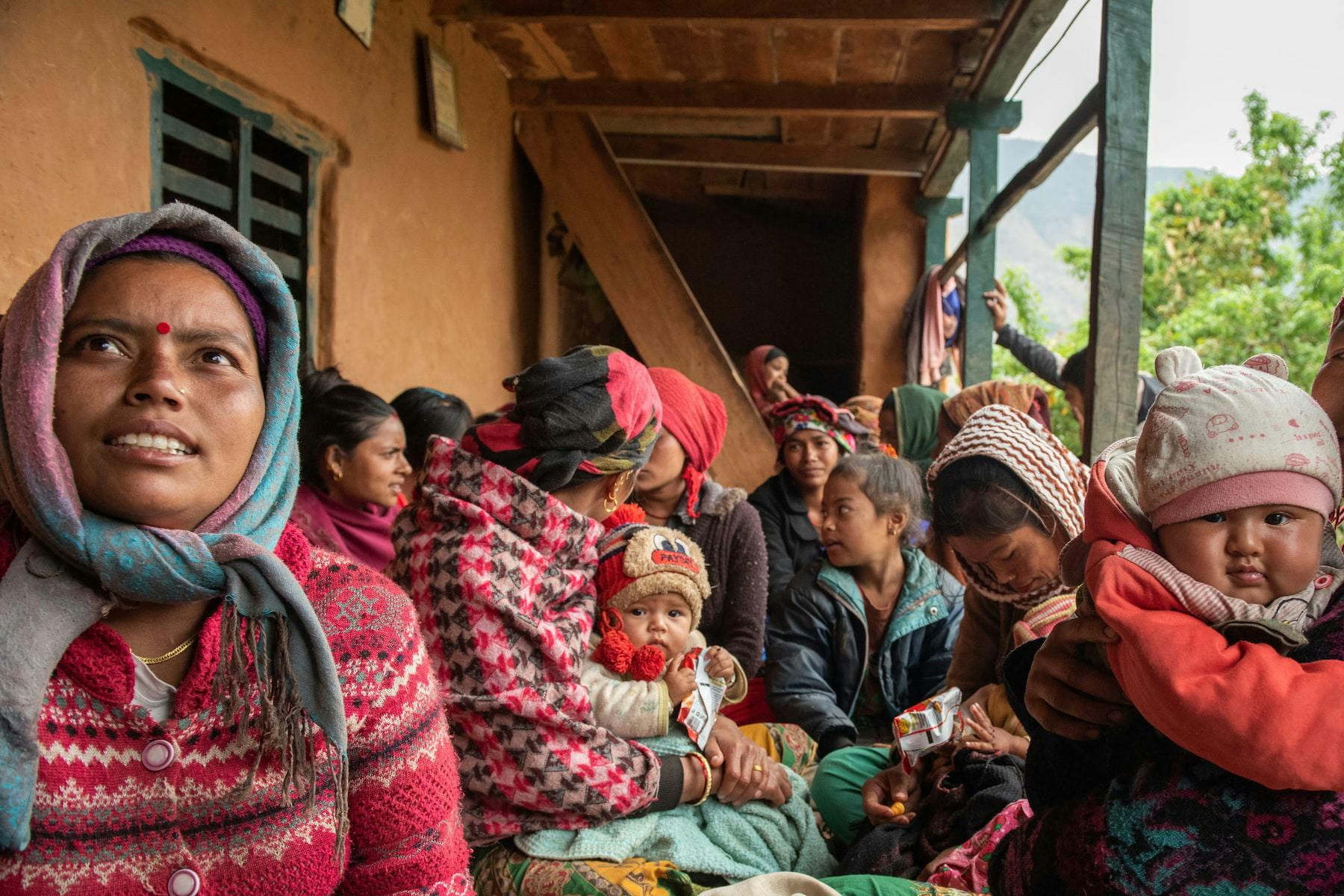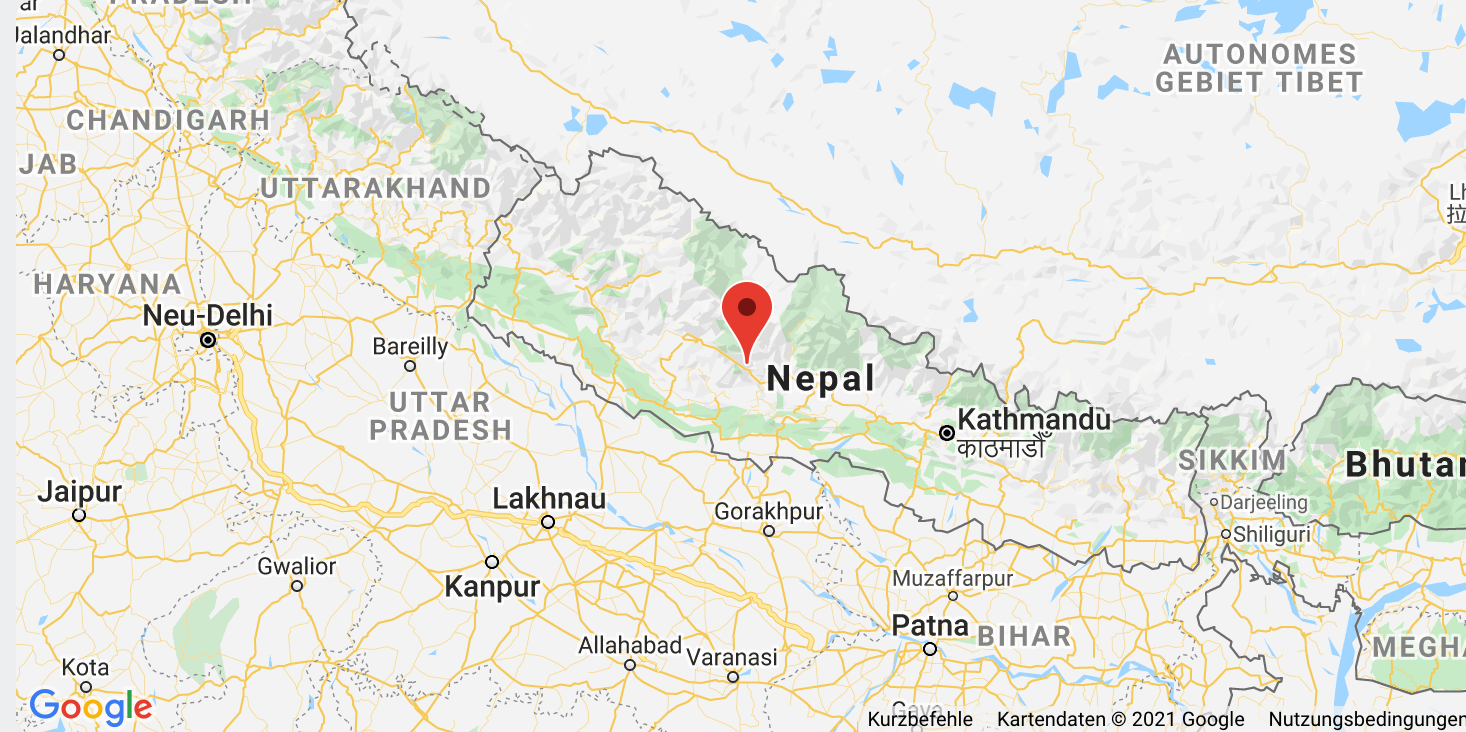Background
Baglung District is located in the west of Nepal in the province of Gandaki. The FAIRMED project encompasses the five municipalities within the district that are particularly remote and which are lacking in basic medical infrastructure. This applies both to the presence of a sufficient number of health stations and their facilities and to the availability of adequately trained health personnel. This situation is often aggravated by limited access to clean drinking water and sanitary facilities. Alongside these deficiencies in the health system, culturally rooted but potentially harmful practices in self-care can stand in the way of prompt and appropriate treatment. When they fall ill, many people visit traditional healers, or young mothers drink up to half a litre of mustard oil after giving birth or consume alcohol during and after birth as they believe this helps them to regain energy. In addition, many sections of the population lack knowledge of how to recognise the first signs of disease and when to seek medical help.
The Project
The aim of this project is to enable the rural population in Baglung – in particular pregnant women, nursing mothers, young children, people with disabilities and people suffering from neglected tropical diseases (NTDs) – to benefit from an improved health system. FAIRMED takes a holistic approach to meeting the complex set of challenges in the project area. In the communities, we support those responsible for health to better plan and implement their health programs. We also ensure that people in the project area have access to health services. We make sure that all healthcare facilities are sufficiently equipped and we provide personnel in the facilities with the necessary medical expertise. Throughout, we help to educate the general public in basic health knowledge and promote health-conscious behaviour at the community level through awareness-raising activities.
Among other measures, we inform people in the communities on how to spot the first signs of neglected tropical diseases and what they can do to support their own health. We also carry out large-scale awareness-raising activities to expose pregnant women and new mothers to the benefits of professional healthcare. For example, we establish and reactivate mothers' groups, where expectant and new mothers can meet regularly and receive information on topics such as family planning, vaccinations for their young children or pregnancy check-ups. We work with health volunteers who serve as a point of contact for medical queries from villagers and who lead, coordinate and support the mothers’ groups.
Objectives and Activities
The main objective of the project is to improve the health situation of the people in the project area. To this end, the project is pursuing three specific aims that are realised through the following activities, among others:
Improved management of health facilities through targeted support for supervisors
Training for health officials in the planning, budgeting and implementation of their activities. This is important as the recent political decentralisation in Nepal means that the municipalities are newly tasked with the independent planning and implementation of health policy activities in their region.
Improving the skills of health workers
Organisation of training for personnel in health facilities. This measure aims among other things at enabling health workers to recognise and treat the first signs of NTDs. Furthermore, personnel should be able to carry out prenatal and postnatal examinations.
Improvement and development of basic health services
Establishment and expansion of health and maternity centres. Among other activities, this includes cooperation with communities in the provision of clean water (water purification / water filters etc.) as well as sanitation for the health facilities.
Support for the communities in the planning and implementation of offers for people with disabilities (e.g. the formation of self-help groups) and in the installation of disabled-friendly infrastructure.
Together with the communities, FAIRMED ensures that health facilities have the necessary medication and medical equipment such as laboratory appliances.
Strengthening the expertise of volunteer health workers so that they become active health promoters in the community. For example, training in the creation of mothers’ groups.
Raising public awareness of health issues
Planning and implementation of range of activities to raise public awareness of health issues and to encourage abandonment of potentially harmful practices. These measures are aimed at improving the health-promoting behaviour of people in the project area, which also results in increased use of health services in the communities.
Coordination and organisation of awareness-raising events for the early detection and treatment of NTDs as well as on the topics of disability and hygiene.
Sustainability and Monitoring
All FAIRMED projects are implemented in cooperation with the local official agencies and with the inclusion of the population on the ground. The regional FAIRMED country offices are staffed exclusively by local employees. With this approach, and aided by consistent monitoring, problems can be identified in a timely manner, causes can be analysed, and methods and objectives can be adapted where necessary. The direct integration of health ministers and partner organisations also ensures that projects can be transferred at a later point and continued without the support of FAIRMED.
Beneficiaries
A total of 390 mother groups, around 1,900 pregnant women, 1,600 nursing mothers, 1,500 newborns, 2,000 people affected by neglected tropical diseases and 150 people with disabilities have been able to benefit directly from the project. Moreover, all of the people in the project area benefit indirectly from improved facilities at the health and maternity centres as well as significantly reinforced health services, which are provided by better trained staff.
No one should suffer or die from a curable disease
Sharma Nirmala • Country Coordinator Nepal
Support FAIRMED
